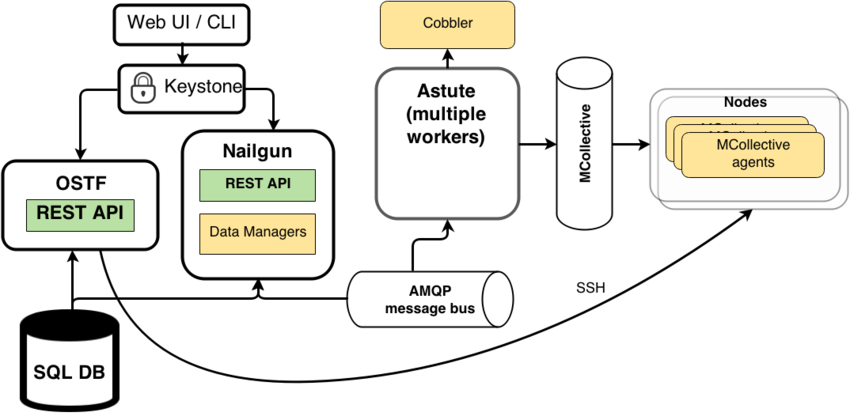Fuel
Contents
What is Fuel?
Fuel is an all-in-one control plane for automated hardware discovery, network verification, operating systems provisioning and deployment of OpenStack. It provides user-friendly Web interface for installations management, simplifying OpenStack installation up to a few clicks.
This installer has been battle-tested during 2013 in a number of OpenStack deployments on platforms like as Dell (C6220 & R320), HP (DL380), Supermicro (6027TR-HTRF), Lenovo ThinkServer (RD530) and Cisco UCS-C.
The key features are:
- hardware discovery
- hardware configuration in UI (networks & disk partitioning)
- ability to spin up and manage multiple OpenStack clusters
- support for non-HA and HA OpenStack deployment configurations
- pre-deployment checks and network validation
- post-deployment checks and running a set of tests for validating deployed OpenStack
- view logs in real-time through UI
- support for CentOS and Ubuntu, and it can be extended to support other distributions too
- support for multiple OpenStack distributions
Mirantis uses Fuel as a part of their Openstack related solutions and they are our major contributor. For more details look at http://software.mirantis.com/
Fuel architecture
Fuel is not monolithic. It consists of several independent components. Some of those components are Fuel specific components, while others are third-party services like Cobbler, Puppet, Mcollective, etc.
- The heart of Fuel project is Nailgun. Nailgun as other Openstack projects is written in Python programming language. It implements REST API as well as deployment data management. It manage disk volumes configuration data, networks configuration data and any other environment specific data which are necessary for successful deployment. It has required orchestration logic to build instructions for provisioning and deployment in a right order. Nailgun uses SQL database to store its data and AMQP service to interact with workers.
- Another important component codenamed Astute implements Nailgun's workers, and it's function is to run certain actions according to the instructions provided from Nailgun. In fact, Astute is nothing more than just a layer which encapsulates all the details about interaction with a variety of services such as Cobbler, Puppet, shell scripts, etc. and provides universal asynchronous interface to those services. Depending on what we need to do we can either manage service directly via its native protocol (for example XML-RPC protocol is used for Cobbler) or we can use Mcollective agents to perform specific tasks such as launching "puppet apply" on a remote node or running a script. Astute is implemented as Ruby library and it is used in thin manager Naily, which represents AMQP consumer.
- Our provisioning service at the moment is Cobbler. There is a POC ready for move to Ironic, and production version is being implemented.
- Puppet is our only deployment service at the moment. It is possible to create MCollective agent to manage other configuration management frameworks, such as Chef, SaltStack, etc.
- We also have a set of Mcollective agents which allow us to perform specific tasks like hard drives clearing, network connectivity probing etc.
- OSTF (OpenStack Testing Framework, or Health Check) is separated component, which can be easily removed and reused without Fuel. It implements post-deployment verification of OpenStack. It's main goal is to verify maximum of functionality taking minimum of time.

Fuel components
Web UI
To get an idea about what Fuel web user interface looks like you can watch this video http://www.youtube.com/watch?v=PppYpbCg4AU This is the recording of Mike Scherbakov's speech at Openstack Summit in Portland in April 2013. Since that time a lot of new features were added but this video gives good introduction.
CLI
Understanding Environment deployment with Fuel CLI
Nailgun
This component is written in Python. It provides REST API and manages all the data about Openstack clusters deployment and management. It is the heart of Fuel.
Astute
Astute is written in Ruby. It is a wrapper around Mcollective. The majority of its functionality is implemented as Mcollective agents. It is mostly for launching arbitrary commands on remote nodes. For example we use it for launching "puppet apply" in order to install all necessary packages and configure services. Besides, it has driver for interaction with Cobbler.
Join Fuel team
Greeting
If you like the idea of free opensource software, if you like the idea of cloud computing, if you like the idea of making the world better, we certainly want you to join. We try to be as much open as possible. We are always glad to share our own experience as well as to adopt incoming ideas. Join us!
Weekly meeting
Fuel team holds weekly meetings on Tuesdays at 1600 UTC in IRC, at the #openstack-meeting-alt channel. If you have a topic to discuss, you can add it to the agenda.
IRC at freenode.net
| #fuel | General channel |
| #fuel-dev | Development channel |
Source code
| Build system | https://github.com/stackforge/fuel-main |
| REST API + CLI + UI | https://github.com/stackforge/fuel-web |
| Deployment orchestrator | https://github.com/stackforge/fuel-astute |
| Puppet modules | https://github.com/stackforge/fuel-library |
| User documentation | https://github.com/stackforge/fuel-docs |
| Openstack Healthcheck | https://github.com/stackforge/fuel-ostf |
| Launchpad project | https://launchpad.net/fuel |
| Review in progress | https://review.openstack.org/#/q/status:open+fuel,n,z |
| Development documentation | http://docs.mirantis.com/fuel-dev |
| Slides | https://docs.google.com/file/d/0B5VvW7EEta1WMTdFajRzY0lGbkU |
| Feature Design template | https://docs.google.com/a/mirantis.com/document/d/1KlTTM0X-v9nVxyG1ZSdOEpf_yj4EtzNL1Q9Sd4v5DX0 |
Roadmap
- Client python library to make third-party applications to use Fuel
- Pluggable architecture in order to easily add specific functionality
- Patching / Upgrade of Fuel itself
- Patching / Upgrade of Openstack (w/o or w/ minimal downtime)
- Closer integration with other Openstack services
Keywords
openstack deploy deployment havana grizzly cobbler install installation provisioning puppet mcollective tripleo ironic web cli ui opensource centos ubuntu redhat rhel distribution discovering python ruby diskimage-builder
